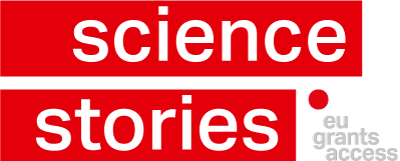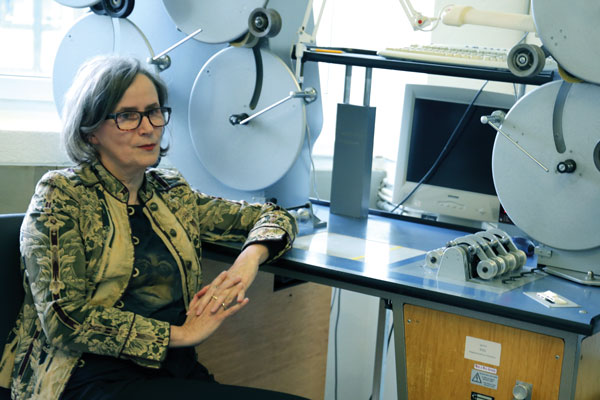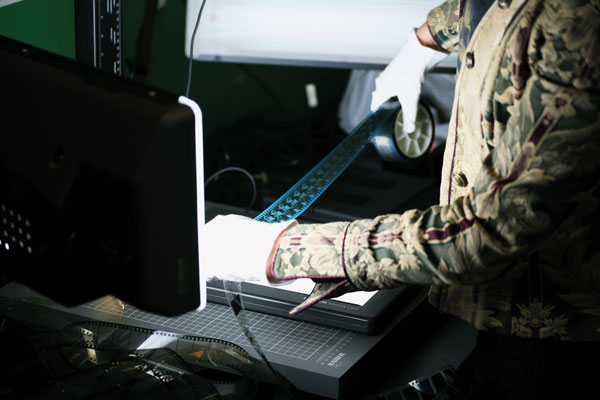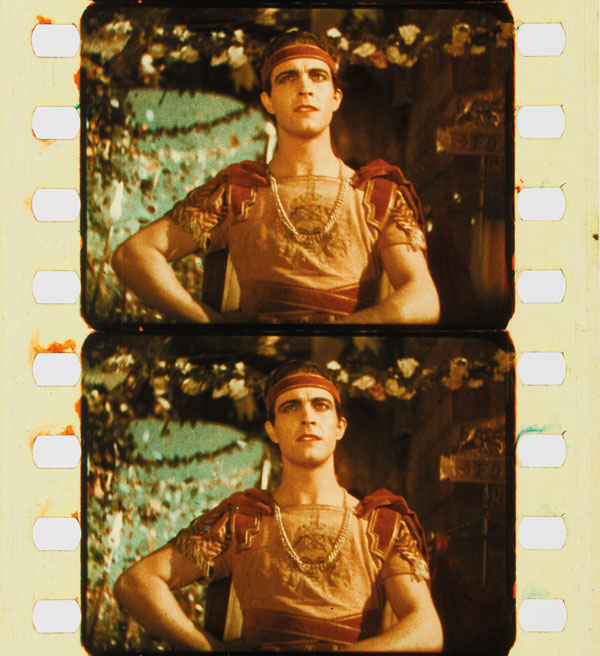
A Passion for Film Colors
An interview with Barbara Flückiger, Professor of Film Studies at the University of Zurich
What fascinates Barbara Flückiger about film color, what research she intends to carry out with her ERC Advanced Grant and what special challenges she faces as a humanities scholar.
What was your first reaction when you got the message that you had received an ERC Advanced Grant?
(Laughing). I was walking around with a big smile on my face for weeks. To receive an ERC Advanced Grant is a great honour and it is a huge amount of money that allows you to assemble a team and to work for several years on one specific topic that you are most passionate about.
Your project is about film colors. What does it mean?
What you see on the cinema screen are first of all colors. This is what my research is about, the color appearance on the screen. In the course of film history, there have been many different approaches to capture and to project these film colors. So basically what I do is historical research into the development of film colors, from the technological side as well as from the aesthetic side; the patterns emerging, how aesthetics and technology interact. We look deeply into technology including chemistry, physics and mechanics of film colors and try to figure out how these properties are connected to specific aesthetic and narrative aims, how film directors, set designers as well as costume designers have been working with these colors to achieve the desired effects.
Please tell us more about the objectives of the project.
First, we are doing an aesthetic analysis of a huge group of films from all decades of cinema history, starting in the late 19th century to the 1990s. Then we are connecting this analysis to an online tool that we are going to develop so that people all around the world can use it for their own film color analyses. In addition, we do material studies, chemical and physical analyses of film stocks. We investigate how the dyes were configured, what spectral properties they have, what kind of chemistry was applied. Moreover, a fourth objective is to digitise and restore historical color films. In summary, the key elements of the project are technology, aesthetics and restoration.
It is common to investigate also the technical and material-related aspects of historical paintings in arts. Yet, in film, such an approach still seems to be unique?
Yes, but I see a change. Today we have a digital pipeline in cinemas and in film production. As a result, the analogue film material and processing are disappearing. For me it is not a surprise that at this very moment there is a growing awareness of the materiality and the material properties of films. However, to investigate and understand these properties requires different kinds of knowledge and this is basically where our project comes in.
What will be the impact of your project?
Film historians, scholars, students, archives, and technical service providers will benefit from our project. We publish our results and the sources on the “Timeline of Historical Film Colors” where they will be available for other researchers or film restoration projects. In addition, we are cooperating with manufacturers of film scanners. Thus, our experience and suggestions will flow back to these producers and users. Our research, therefore, will also have an immediate practical value.
It is not very often that a researcher from the field of the humanities receives an ERC Advanced Grant. What have been the specific challenges you were facing when you applied for the grant?
When you look at the grant application procedure, you see instantly that it is mainly designed for science rather than for the humanities. All the output of an applicant’s research is measured with the usual impact factors, which are very common in science but not so much in the field of humanities. Scholars from the humanities usually write books and not primarily many publications in high-ranked impact factor journals. As a result, it is much harder to display your achievements. The required description of the planned project is also very science-oriented, since it has to be very brief. It has to address a very broad audience of scholars from the humanities and social sciences while still being very specific and that is quite a challenge. In science disciplines, it is easier to boil your project down to a few pages, whereas in the humanities you have to describe your methods and topics in more detail.
So language is a topic?
Language is certainly a topic because you have to be very specific. The language and the terms you use have to be very precise. Therefore, I think people who are not English native speakers are facing greater obstacles to write this sort of applications. I publish numerous papers in English, but I still write many publications including my books in German – exactly because language is so important in the humanities.
Which were the specific challenges you were facing in your institution?
In my case, I have a specific position, as I am a professor ad personam – which means that I do not have the benefit of assistants. As a result, I have to overcome all the managerial challenges of the ERC project by myself, down to the minute detail, including the purchase and installation of the technical equipment we need, which is huge. In contrast, scientists very often have a lab and their research group. They can rely on a lab manager who is a scientist but also a professional in organising infrastructure and executive processes of projects. However, people from the humanities, even if they are head of a department, usually do not have such infrastructures and expertise in their team. And then of course it is also about money.
What do you mean by money?
The corresponding university receives a significant amount from an EU grant to cover the cost of its infrastructure. The University of Zurich is given an additional 25% of the direct project costs of an EU project as overhead, which might be fair in the case of science projects where labs and expensive equipment financed by the university are needed. Nevertheless, regarding projects in the humanities, the university has to deliberate whether it is appropriate to apply the same overhead percentage as for science. Humanities are much cheaper. We usually need rooms, IT infrastructure, laptops and books. So in order to motivate more researchers from the humanities to apply for an ERC Advanced Grant, it might be helpful if the University of Zurich would reconsider its practice.
Did you get any support from the University when you applied for the grant?
Absolutely. I received great support from EU GrantsAccess and also from the National Contact Point of the European Research Council. This help was very instrumental to successfully apply for this kind of highly competitive grant.
Would you recommend applying for an ERC grant to your colleagues from the humanities?
Of course. Actually, I even offered a workshop for my colleagues from our faculty to support them in understanding how they can meet the requirements of such an application process. In this workshop, I provided insights for project development from the point of view of a humanities person on how we can translate our topics into this kind of content management system.
Let us return to film. In which way has digitisation changed the film world?
It has changed the whole film production process. Today, there is a very crucial pre-production stage for the planning of how one combines elements that are created on the computer and elements that are captured with actors on location. Then, there is a very important post-production stage where one assembles all these elements. Let us consider a film with a typical computer-generated dinosaur. You have to do much planning to figure out how big the dinosaur is going to be, where it is being placed, how actors interact with it, where they are looking at as the dinosaur is not on the set but exists only virtually in the computer. More and more of these productions are comparable to theatre projects as actors are performing on an empty green screen stage. They do not have anything or anyone to interact with. They are in a completely virtual environment. Hence, we are also facing greatly different notions about acting and directing films.
And what may we expect next in film production?
What is coming next is very much on my horizon because I have been developing another research project this year with other partners. We were looking into new technologies that are emerging in the near future. Thanks to these novel technologies, there will be a broader range of colors, higher contrast, different kinds of audio systems, higher frame rates and stereoscopic 3D cinema. There are many sophisticated technologies emerging and some are already in place in specific cinemas around the world. They will certainly be seen in our cinemas in a few years. Before these developments will be put into practice, we are planning to investigate how said technologies again affect the creative process of filmmaking as a whole and the audience’s perception of movies.
The ERC Expert Group of EU GrantsAccess
The European Research Council (ERC) Expert Group of EU GrantsAccess deals with the submission particularities and guidelines of ERC project proposals. Together with their colleagues from the corresponding central administration, they compile the necessary procedures that apply to the University of Zurich and ETH Zurich. The ERC Expert Group keeps informed about the latest developments and regulations and organises ERC workshops and information events. The constant exchange of information with the National Contact Point for ERC at the Euresearch Head Office in Bern ensures that the latest developments are identified timely and may thus be considered by the entire counselling team of EU GrantsAccess.
An experienced member of the EU GrantsAccess team personally advises and supports every ERC project from the proposal to the implementation phase. The principal investigators are thus somewhat exempt from administrative tasks and may focus on the scientific aspects of their project.
Members of EU GrantsAccess’ ERC Expert Group
Jonas Oehler (Lead), Regina Notz, Nicolas Schulthess, Alexandra Zingg.
Barbara Flückiger
Barbara Flückiger has been Professor of Film Studies at the Faculty of Arts and Social Sciences of the University of Zurich since 2014. She studied German language and literature, film and media at the Universities of Zurich and Berlin and graduated with a master degree in 1995 and a PhD in film studies in 2001. In 2007, her habilitation thesis on computer-generated visual effects was accepted at the Freie Universität Berlin. Barbara Flückiger developed and executed several research projects on film technologies financed by the Swiss National Science Foundation and the Federal Commission for Technology and Innovation CTI. Before her academic career, she was a film professional working on productions in Europe and the USA. She collaborated with renowned film directors such as Markus Imhoof, Lea Pool, Daniel Schmid and Claude Goretta. In May 2015, she was awarded the European Union’s top research award, the Advanced Grant of the European Research Council (ERC) for her project “Film Colors”.
ERC project “Film Colors. An Interdisciplinary Approach.”
Barbara Flückiger and her research team will systematically investigate the relationship between technological processes and the aesthetics of film colors through a new interdisciplinary approach and with a novel methodology. The project will develop software to analyse a large number of color films from each decade since the invention of film itself. Aesthetic analyses in film history will be supplemented with measurement methods from the natural sciences to investigate the chemical and physical characteristics of film colors. Fields of application for the aesthetic and technical analyses include digitisation and restoration of historic films in the framework of the research project. In addition, research findings will continuously contribute to a digital humanities platform developed by Barbara Flückiger called the “Timeline of Historical Film Colors”.
http://zauberklang.ch/filmcolors
The EU supports this ERC Advanced Grant with 2.9 million Euros.






